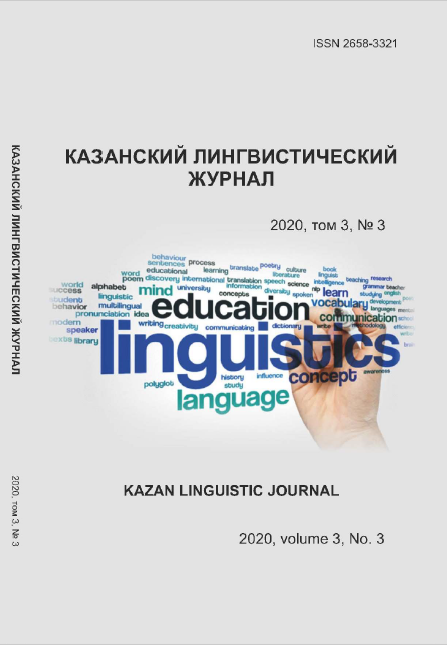“Divine” origin of some Russian words
Keywords:
бог (‘lord, god’), воздавать (‘render, give back’), давать (‘give’), дева (‘a maid’), невеста (‘a bride’), dissimilation, etymology, the Indo-European theory, the matres lectionis alternation theoryAbstract
Semantics of the Russian words дева ‘a maid, a girl, a virgin’, дочь ‘a daughter’, невеста ‘a bride’ existing in Russian and foreign etymological dictionaries is examined in the article. The relevance of the topic is determined by inadequacy and obsolescence of the existing etymologies of the words, as well as by insufficient glottochronology. On the basis of the application of the phenomenon of [d/n] sound dissimilation and the matres lectionis alternation theory the author makes an attempt to introduce his own etymology of the words under question in the light of this theory.
References
Литература
Академик // URL: https://dic.academic.ru/dic.nsf/lubker/7427/НЕМЕТЫ. (дата обращения 28.04.2019).
Архив сайтов. // URL: https://web.archive.org/web/20051028161552/http://www.roman-britain.org/tribes/demetae.htm. (accessed:28.04.2019)
Википедия // URL: https://ru.wikipedia.org/wiki/Государство. (дата обращения 28.04.2019).
Едемский М.Б. Свадьба в Кокшеньге Тотемского уезда, 1910. Переизд. Вологда, «Легия», 2002.
Кочергина В.А. Санскритско-русский словарь. Москва: Русский язык, 1987.
Орбини М. Славянское царство. ОЛМА-Медиа-Групп, 2010.
Орбини М. Историография початия имени, славы и расширения народа славянского, и их царей и владетелей под многими именами, и со многими царствиями, королевствами, и провинциями. С-Пб., 1722.
Откупщиков Ю.В. Очерки по этимологии, изд-во СПбУ, 2001.
Повесть временных лет. М.: Л., 1950. Ч. I. С. 15.
Расторгуева В.С., Эдельман В.И. «Этимологический словарь иранских языков», том I, Москва: Восточная литература РАН, 2000.
«Россия – родина Германии». Техника молодежи, 1997. С. 42.
Тюгашев Е.А., Попкова Т.В. Семьеведение. Глава V. Обряды семейного цикла. Новосибирск: СибУПК, 2003.
Узенёва Е.С. Славяне-мусульмане Южной Славии: терминология народной культуры. Сборник «Славянское языкознание. XVI Международный съезд славистов. Белград, 20–27 августа 2018 г. Доклады российской делегации». Москва, Институт славяноведения РАН, 2018 г. C. 499.
Фасмер М. Этимологический словарь русского языка. Москва: Прогресс, 1987.
Черных П.Я. Историко-этимологический словарь современного русского языка. Москва: Русский язык, 1999.
Штейнберг О.М. Еврейский и халдейский этимологический словарь к книгам Ветхого Завета. Вильна, 1878.
Этимологический словарь славянских языков. Праславянский лексический фонд. Выпуск 25. М.: Наука, 1999.
De Vaan M. Etymological dictionary of Latin and the other Italic languages. Volume 7, Brill, 2008.
Online etymological dictionary // URL: https://www.etymonline.com.
Orel V.E., Stolbova O.V. Hamito-Semitic Etymological Dictionary. Materials for a reconstruction. E.J. Brill, 1995.
Starostin S. Turkic Etymology, 1998¬2009.
References
Academic. // URL: https://dic.academic.ru/dic.nsf/lubker/7427/НЕМЕТЫ. (дата обращения 28.04.2019).
Archive.org // URL: https://web.archive.org/web/20051028161552/http://www.roman-britain.org/tribes/demetae.htm. (accessed:28.04.2019)
Wikipedia. // URL: https://ru.wikipedia.org/wiki/Государство. (accessed:28.04.2019)
Edemskii M.B. (2020). Wedding in Kokshenga, Totemsky district, 1910. Reprinted. Vologda, «Legiya».
Kochergina V.A. (1987). Sanskrit-Russian Dictionary. Moscow: Russkii yazyk.
Orbini M. (2010). Slavic kingdom. OLMA-Media-Grupp.
Orbini M. (1722). Historiography of honoring the name, glory and expansion of the Slavic people, and their kings and rulers under many names, and with many kingdoms, kingdoms, and provinces. S-pb.
Otkupshchikov Yu.V. (2001). Etymology essays. Izd-vo SPbU.
The Tale of Bygone Years. (1950). Moscow: L. Part I. P. 15
Rastorgueva V.S., Edel'man V.I. (2000). “Etymological Dictionary of Iranian Languages”. Vol. I. Moscow: Vostochnaya literatura RAN.
“Russia is the homeland of Germany” (1997). Tekhnika molodezhi. P. 42.
Tyugashev E.A., Popkova T.V. (2003). Family studies. Chapter V. Rituals of the family cycle. Novosibirsk: SibUPK.
Uzeneva E.S. (2018). Muslim Slavs of South Slavia: the terminology of folk culture. Collection “Slavic Linguistics. XVI International Congress of Slavists. Belgrade, August 20-27, 2018 Reports of the Russian Delegation”. Moscow, Institute of Slavic Studies RAS. 499 p.
Fasmer M. (1987). Etymological dictionary of the Russian language. Moscow: Progress.
Chernykh P.Ya. (1999). Historical and etymological dictionary of the modern Russian language. Moscow: Russkii yazyk.
Shteinberg O.M. (1878). Hebrew and Chaldean etymological dictionary to the books of the Old Testament. Vilna.
Etymological Dictionary of Slavic Languages. Proto-Slavic lexical fund. (1999). Issue 25. Moscow: Nauka.
De Vaan M. (2008). Etymological dictionary of Latin and the other Italic languages. Volume 7, Brill.
Online etymological dictionary. // URL: https://www.etymonline.com.
Orel V.E., Stolbova O.V. (1995). Hamito-Semitic Etymological Dictionary. Materials for a reconstruction. E.J. Brill.
Starostin S. (1998-2009). Turkic Etymology. 1998.






